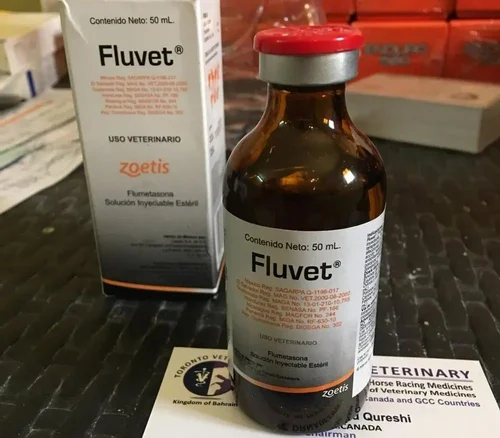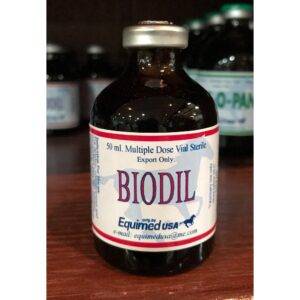Fluvet
fluvet injection is a veterinary medication used to treat inflammation, pain, and fever in animals. It is most commonly administered in livestock, horses, and sometimes companion animals for conditions requiring anti-inflammatory and antipyretic action. fluvet 50ml
Active Ingredient
Flunixin Meglumine: A non-steroidal anti-inflammatory drug (NSAID).
Mechanism of Action
It works by inhibiting the cyclooxygenase (COX) enzymes, which play a role in the synthesis of prostaglandins. Prostaglandins are chemicals responsible for inflammation, pain, and fever. By blocking their production, Fluvet provides relief from these symptoms.
Indications
Fluvet is used in various conditions, depending on the species. Common indications include:
Cattle:
Respiratory Diseases: Relieves inflammation and fever associated with bovine respiratory disease (BRD).
Endotoxemia: Reduces symptoms caused by bacterial infections.
Mastitis: Controls fever and inflammation during acute mastitis.
Horses:
Colic: Provides pain relief in colic cases. fluvet 50ml
Musculoskeletal Disorders: Treats lameness, tendonitis, or joint inflammation.
Endotoxemia and Septicemia: Reduces systemic inflammation.
Swine:
Respiratory Diseases: Used for fever reduction in swine respiratory disease.
Dogs (occasionally):
Post-surgical pain relief and inflammation control.
Dosage and Administration
Fluvet is usually administered intravenously (IV) or intramuscularly (IM). The dosage varies by species and condition:
Cattle:
Dose: 1.1–2.2 mg/kg body weight once daily.
Route: IV or IM.
Duration: 3–5 days as needed. fluvet 50ml
Horses:
Colic: 1.1 mg/kg body weight IV or IM as a single dose. Can be repeated every 12 hours if necessary.
Musculoskeletal Disorders: 1.1 mg/kg daily for up to 5 days. fluvet 50ml
Swine:
Dose: 2.2 mg/kg body weight IM.
Frequency: Typically a single dose.
Dogs (if prescribed):
Varies; consult your veterinarian.
Benefits
Rapid Relief: Quickly reduces fever, pain, and inflammation.
Versatile Use: Effective across a range of species and conditions. fluvet injection
Improves Recovery: Particularly beneficial in infections when combined with appropriate antibiotics.
Side Effects
While generally safe when used as directed, NSAIDs like Fluvet may have side effects:
Common Side Effects:
Mild gastrointestinal upset (diarrhea, vomiting in dogs).
Swelling or pain at the injection site. fluvet 50ml
Severe Side Effects:
Gastrointestinal Ulcers: Risk increases with prolonged use or high doses.
Kidney Damage: Especially in dehydrated or compromised animals.
Allergic Reactions: Rare, but possible.
Hematologic Changes: Prolonged bleeding times in rare cases.
Precautions
Hydration: Ensure animals are well-hydrated to minimize kidney risks.
Pregnancy: Use cautiously, as it may affect fetal development.
Concurrent Medications: Avoid combining with other NSAIDs or corticosteroids to reduce the risk of gastrointestinal or kidney damage.
Underlying Conditions: Not recommended in animals with pre-existing kidney, liver, or gastrointestinal issues.
Withdrawal Periods
Meat: Typically 4-8 days, depending on local regulations.
Milk: Usually 36-72 hours post-treatment. Always verify with local guidelines.
Storage
Store between 15-30°C (59-86°F). fluvet injection
Protect from light and extreme temperatures.
Shake well before use if indicated.
Alternatives
Phenylbutazone: Another NSAID for pain and inflammation in horses and livestock.
Meloxicam: Often used for longer-term inflammation control.
Ketoprofen: A similar NSAID used in cattle and horses.
Fluvet Injection
It is a reliable and widely used NSAID in veterinary medicine for treating inflammation, pain, and fever. Proper administration and adherence to veterinary guidelines ensure its efficacy and safety. Always consult a veterinarian for specific treatment protocols and to monitor for potential side effects. fluvet 50ml





Reviews
There are no reviews yet.